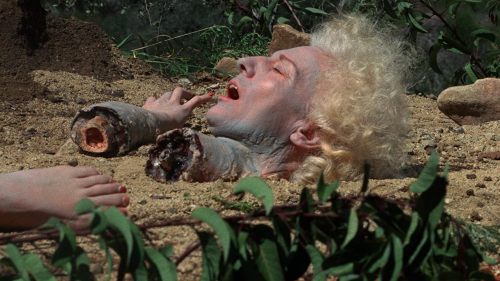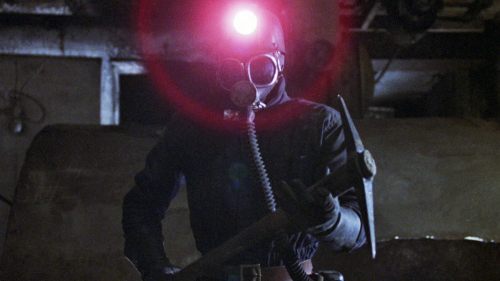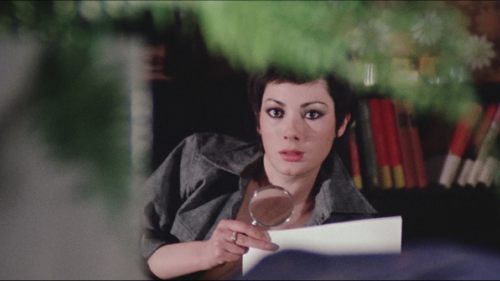Collins’ Crypt: Horror Protagonists Need To Stop Cheating On Each Other
The virgin will survive. The car will break down in the middle of nowhere. The black guy will die first*. Some horror cliches have been around for eons and the genre isn't really hurt by them. Just like the Western hasn't been ruined by greedy land-owners and romantic-comedies will continue to survive breakups at the end of the second act, tired horror cliches aren't exactly going to kill off scary movies for good. The Devil's in the details, as they say, and therefore it doesn't matter if this or that plot point has been done to death - all the better to lure your audience into a false sense of security ("Oh, I know where this is going...") before springing your more original storytelling devices on them (or, if it's a slasher movie, some sweet new kill scene ideas).
But there is one that really needs to go away, preferably forever: the infidelity/betrayal within our core group of protagonists. I don't know when the trend started (the rise of cell phone cameras and social media seemed to correlate - there's almost always a video involved now), but it's gotten to the point where I expect to hear "We're supposed to be best friends - how can you betray me like that?!?" more often than "I can't get a signal" in one of these things. Over the weekend at the LA Film Festival, I saw Don't Hang Up, a reasonably solid thriller about some prank callers who call the wrong person and pay for it with their lives, and as soon as the hero's girlfriend was revealed to be "acting weird lately" (or whatever the exact description was) in the first ten minutes I knew that she was cheating on him, most likely with his best friend, i.e. the only other character in the movie with more than five minutes of screentime. When it was finally revealed at the end of the second act (roughly? I didn't look at my watch but it was certainly obvious to me a long time before our hero found out) I just sighed heavily - I was holding out hope that I was wrong and it would be something more interesting for a change. It's like writers (or their producers) think that we can't be invested in the characters' lives unless there is some pre-existing drama that needs to be worked out throughout the course of the evening (and by worked out I mean the offending parties get their heads chopped off by a guy who didn't care who was nailing who). And 99% of the time, the betrayed one finds out during the movie's narrative, when they have more pressing matters, like a guy with a mask and a big knife. I wouldn't have a problem with them finding out before the movie started and that's what prompts him/her (usually her) to go off into the woods or whatever, but that's rarely, if ever, the case - it's always something to be discovered.
Then again, at least our not-so-hypothetical heroine finds out in that scenario - some can't even bother to get that far. Texas Chainsaw 3D has plenty of other problems, so it's not like it was ruining a classic, but it drove me insane that the movie went out of its way to establish that Alexandra Daddario's boyfriend was cheating on her with her best friend, and that information dies with them/the audience, as Daddario never learns about their secret affair. The movie is wildly mocked for its ridiculous ending, where Daddario's character hands Leatherface back his chainsaw and says "Do your thing, cus!" (because the characters are cousins) and stands by as he murders some random other characters - why not have it so the scorned woman takes EXTREME revenge and lets the mass murderer hack up the people who betrayed her? Or, you know, at least have her find out about it, so the subplot can be justified in some way?

Because whether the offended party finds out about it or not, it doesn't change the fact that the screenplay has established two of our characters as unlikable shitheads. The easiest complaint one can levy at a horror film, particularly slashers, is that characters are wafer-thin, so when the one thing we know is that they're kind of scummy, it's like doubling down on obnoxiousness. Even basic things like what they do for a living, whether or not they plan to go to college or have a family... all of these things are often left to our imagination, but they'll spend a couple minutes on "We can't keep doing this, I feel guilty" "He/she doesn't have to know, it'll destroy him/her!" conversations more often than not as of late. And it's ALWAYS the best friend, too - movie boyfriends are apparently incapable of sleeping around with someone the heroine barely knows, if at all. If they're such risk-takers why the hell are they so quick to run away from the guy with the machete? Halloween 4 is one notable exception - Rachel's boyfriend gets pissed when she breaks off their date and blows off steam by banging Kelly, the local hot girl, but it's hardly an ongoing thing, and Rachel and Kelly are clearly not friends (Rachel actually gets a frown on her face when Kelly opens her own front door - before she sees her boyfriend half-undressed behind her). In Friday the 13th: The Final Chapter, "cheating" is even less an issue - one of the guys flirts a bit with a girl, pissing off his actual girlfriend, who is annoyed and leaves - and then they become the first two to get killed off anyway. It was literally just an excuse to get our first victims isolated so they could be killed, which isn't exactly an option for the movie's Final Girl.
Some people like to argue that we just watch these movies to see the people die and thus it's perfectly fine, perhaps even preferable, if they're less than noble. And I get that argument to a certain extent, but I also get that the slasher movies I love (and most of the ones you do too) didn't bother with any of that nonsense. Halloween, Friday the 13th, Nightmare on Elm Street, and Scream (and all of their sequels except the two above minor exceptions) never stooped to such a thing, though Scream gets an asterisk as our heroine's *mother* had an affair with Billy's father, prompting the destruction of his family and his murderous rage. Again, this isn't what I'm really talking about here - Sid's mom is dead before the movie even starts and Billy's dad has I think one scene - it doesn't ruin our opinion of any of the characters, and it's actually important to the plot. A good love triangle can be fine in a horror movie, but it's the betrayal/sneaking around element that makes it far less compelling. My Bloody Valentine is a fine example - at some point before the movie begins, TJ leaves town, and his girlfriend Sarah begins seeing Axel, one of his closest friends. The movie picks up when TJ has returned to town, jealous of his former pal and still harboring feelings for his now-ex. That's a solid bit of personal drama to flavor our story of a guy in a gas mask pickaxing a bunch of drunken Canadians. No one was doing anything WRONG, per se - it's just a situation that isn't ideal for our hero. True to form, the 2009 remake - which I like - retained this element but "intensified" it - Axel (married to Sarah in this one) is cheating on his wife with a girl she works with, natch.

Now, I'm not saying I can't enjoy a movie with this - Hills Run Red is a solid modern slasher (and like Don't Hang Up, another rare instance of a guy being the one getting cheated on), and I was a big fan of the movie Animal which also included it (with a minor, almost admirably progressive variation - the heroine's boyfriend cheated on her with another guy!). But it's an "everything in moderation" kind of thing, and I've just seen it far too many times in recent years. Even when there's something novel about it, like Animal, it fails to generate any real effect on the narrative or the characters - it's usually just something else to frustrate them during the hectic situation. Going back to Halloween 4: it added awkward tension to the situation, it offered us another reason to admire Rachel (because she confronts the girl about it, which is rare), and it gave the movie the inciting incident it needed to separate Rachel from little Jamie (because she's too busy yelling at Brady to really notice that Jamie has kept on going with her friends). In most of these modern ones, you're lucky to even get ONE of those "perks" out of the incident, let alone several. In the aforementioned Don't Hang Up, the girl in the middle is never even aware that her boyfriend knows about her betrayal, rendering the whole subplot rather meaningless - it's a personal, character-driven thing, so why do it if all involved parties aren't even affected? On that note, if you can provide me with one solid bit of defense for Chainsaw 3D's version, I'd love to hear it (and don't say "to get them naked" - they could have just been a regular couple from the start).
So I beg any horror movie screenwriters that may be reading: PLEASE give this a rest. There are other ways to create drama within the core unit of friends, and I urge you to consider them. How about (if they're old enough) one made a bad investment in the best friend's now-failed business? Or one's jealous that they weren't invited to the heroine's wedding? Hell, as stupid as it would be, I'd rather see the fallout from a friend being muted on Twitter than be forced to sit through the 1000th variation on "I think we should tell her about us". I mean, you could also forgo any drama at all, since it worked just fine for Halloween (well, Laurie DID forget her chemistry book) and the original Friday the 13th, because sometimes it's nice to just genuinely like the people who are in danger and hope they survive. But if you simply must have your heroes at odds, there are other ways to do it that don't involve anyone's libido. I'd ask you to consider them.
*I'm not even sure how this "cliche" started, because I swear I've seen more examples of black guys in movies SAYING this is what happens than actual instances of it happening. Take the Friday the 13th series, for example. Not that the series had a wealth of black characters, but many of them - Julius in Manhattan, Brodski in Jason X, etc. made it almost all the way to the end, outlasting several of their white co-stars.



